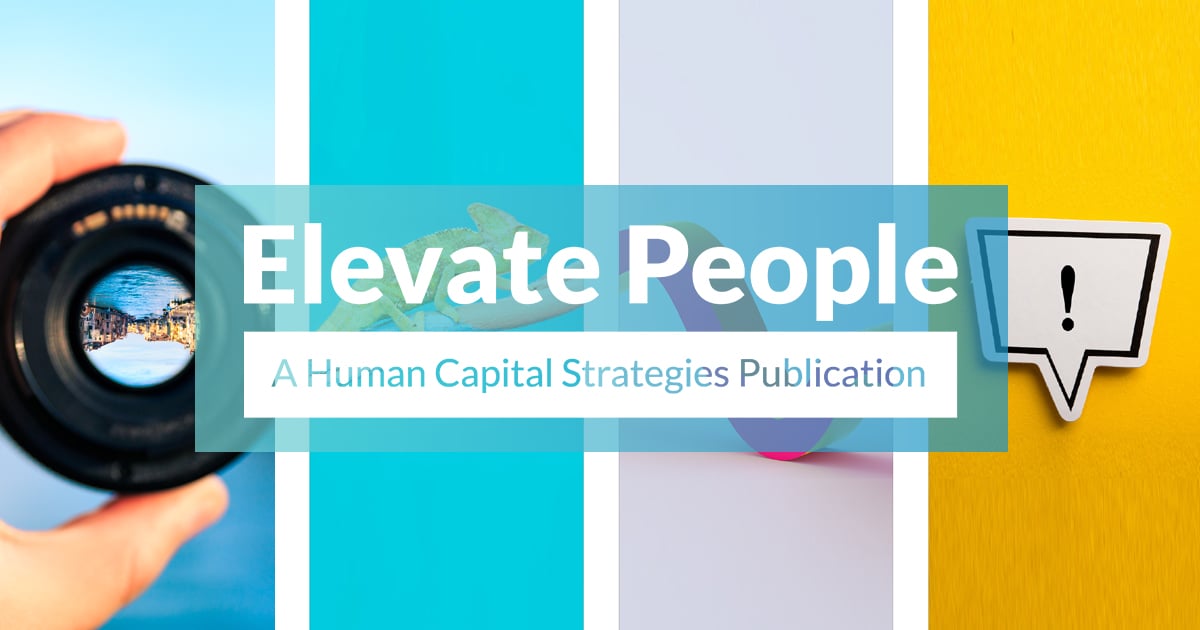Elevate People March 2021
March 8, 2021 •The HoganTaylor Human Capital Strategies Practice

"Elevate People" is a HoganTaylor Human Capital Strategies practice publication designed to help you manage and stay current on issues impacting your workforce.
How Unconscious Bias Affects Recruitment Strategies
 By Cathy Oertel, HR Consultant, Human Capital Strategies
By Cathy Oertel, HR Consultant, Human Capital Strategies
Have you ever been at the point in the hiring process where you’re narrowing it down to a couple of candidates and both are equally qualified, so you rely on your “gut instincts” to help you decide which candidate to make the offer to. What may seem like an innocent or legitimate way to make this important decision can be an example of unconscious (or implicit) bias. The best way to avoid this bias from affecting your recruitment strategies is first to be aware of it! Once you are aware of bias, you can actively work against that type of thinking. You can make better and more inclusive hiring decisions at this point.
Below is a link to an article that covers 16 examples of unconscious bias and how to avoid them in the workplace. Avoiding biases in your hiring practices will help in building a more diversified and inclusive workforce. The EEOC (Equal Employment Opportunity Commission) provides resources for curbing biases and there is a link to these resources here They focus on transparency and provide examples of what biases could look like in your job postings.
16 Examples of Unconscious Bias
The Role of Psychological Safety in Adaptive Innovative for Your Business
 By Katrina Dougan, Senior Consultant, Human Capital Strategies
By Katrina Dougan, Senior Consultant, Human Capital Strategies
As organizations continue to grapple with the accelerated rate of change, the ability to innovate, adapt and optimize both how and what work is carried out has for the majority become imperative. In order for organizations to realize this level of adaptive innovation, “psychological safety” must be present in your culture. Psychological safety exists when leaders, teams and individuals hold the shared belief they can ask for help, share suggestions and challenge the status quo without fear of negative consequences.
Building a culture of psychological safety starts at the top, with leaders both learning and modeling the supporting behaviors and management styles. Helping your leaders to develop these critical skills and behaviors around appreciative inquiry, coaching, self-awareness and growth mindset to name a few, will create the necessary foundation for psychological safety in your organization. This will in turn help to drive the needed adaptation and innovation around the right changes to help your business thrive.
Contact us if we can help you with your leadership development and training needs in this area. For more reading on this topic and current research, click here.
2021 Trends: Q1 First Look
 By Sara Harris, Consulting Manager, Human Capital Strategies
By Sara Harris, Consulting Manager, Human Capital Strategies
As we begin to wrap-up the first quarter of 2021, I came across this article from back in November, outlining the 7 HR trends for 2021. It made me pause and think, and read through it to see if they had predicted such events as the recent #snowmageddan, #snowpocalypse or my personal favorite #snovid, brought to many of our states in the last few weeks.
While a specific reference to weather events was not included in the trend report, they certainly nailed it with topic #1 & #3 , in ensuring we extend humanity to our people, and offer flexibility in the workplace. We all know that COVID expanded workplace flexibility to a whole other level, which makes adapting to a 100 year storm a little more achievable. However, we must remember, our humanity and kindness towards others extends beyond where we are working for the week of a snowstorm, or months to come as businesses work through repairs and find alternative ways to keep their businesses open and their people employed.
Take time to find ways to help in your community. If you have volunteer days for your employees, now may be a good time to send reminders and encourage them to use the annual time and help with the recovery. If you have organizational needs or are seeking options to solve workplace challenges, our team is available to connect with you and collaborate on various solutions. We wish you all well as we make our way through the end of this first quarter and navigate through all 2021 has to offer.
HR’s Top Priority in 2021? Strategic Partnership
 By Cathy Oertel, HR Consultant, Human Capital Strategies
By Cathy Oertel, HR Consultant, Human Capital Strategies
HR can be many things – transactional, supportive, etc. But most recently, HR has moved to the forefront of being a strategic advisor to the leaders in the organization. With the onset of COVID last year, HR practitioners were put to the test to help lead their organizations through crisis. The goal for HR now is to keep that partnership with their leadership team and remain that go to strategic business partner. For more information, check out this article.
HoganTaylor's Human Capital Strategies Practice
If you have any questions about this content, or if you would like more information about HoganTaylor's Advisory practice, please contact Sara Harris, Human Capital Strategies Consulting Manager, at sharris@hogantaylor.com. More information is also available on the Human Capital Strategies page of this website.
INFORMATIONAL PURPOSE ONLY. This content is for informational purposes only. This content does not constitute professional advice and should not be relied upon by you or any third party, including to operate or promote your business, secure financing or capital in any form, obtain any regulatory or governmental approvals, or otherwise be used in connection with procuring services or other benefits from any entity. Before making any decision or taking any action, you should consult with professional advisors.
Get Updates
Featured Articles
Categories
- Advisory Publications (4)
- Business Valuation (6)
- Employee Benefit Plans Publications (26)
- Energy Publications (7)
- Estate Planning Publications (31)
- Forensic, Valuation & Litigation Publications (20)
- HoganTaylor Insights (8)
- Human Capital Publications (44)
- Lease Accounting Publications (15)
- Nonprofit Publications (60)
- Tax Publications (83)
- Technology Publications (10)
- Wealth Management (2)
10 Human Capital Questions to Consider
It's important for employers to regularly conduct a human resources (HR) analysis of their policies and practices. Download our 10 question checklist to see whether you might need an assessment.


